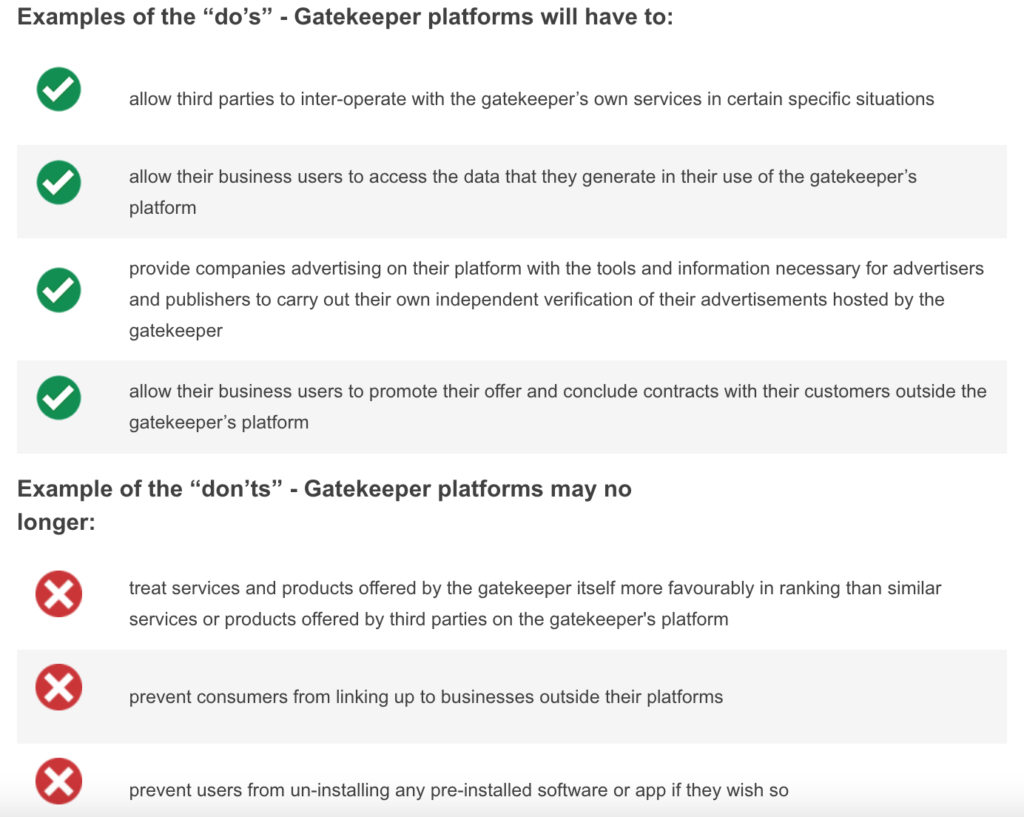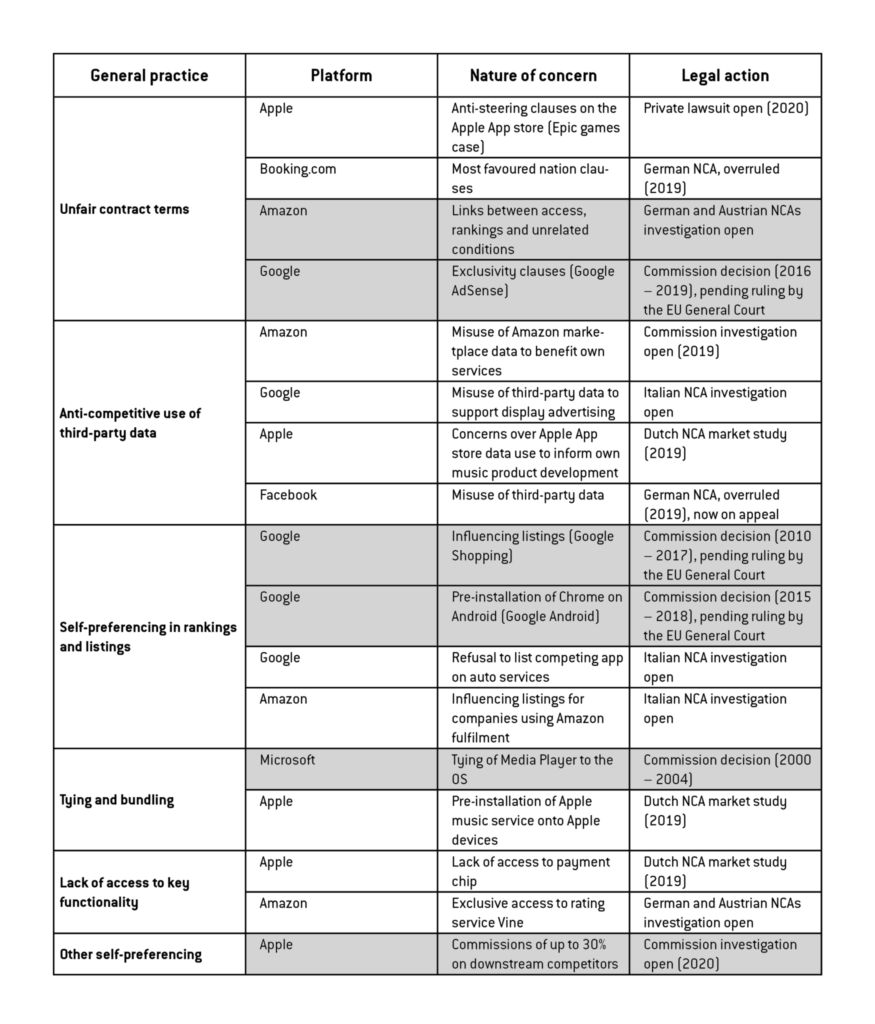What’s the Digital Market Act and what will it mean for app marketers?
App News
October 13, 2022
2022 is setting up to be an important year for tech regulations. While last year was marked by ATT’s arrival and talks about privacy and personal data, with a touch of Facebook Papers near the end, this year will likely be filled with new laws for the tech industry. One of those projects is the European Union’s Digital Market Act (DMA), which threatens to shake things up in the app world.
What’s the Digital Market Act?
The European Union has two projects to regulate the tech industry: the Digital Market Act (DMA) and the Digital Services Act (DSA). The DSA is more generally aimed at protecting online safety whereas the DMA strives to level the playing field for everyone. According to the European Union, here are the main goals:
- DSA: make the internal processes of online platforms more transparent to allow more informed business decisions
- DMA: give business access to data held by gatekeepers (all the tech giants such as Google, Apple, and Facebook), businesses will be free to choose among different platforms to offer their services of products and to switch and combine between services.
The DMA’s main point is to define who are the gatekeepers of the tech industry. While no one’s been named, everybody guessed this was an attempt to regulate Apple, Google, Amazon, and Facebook’s power in the European market. It would be done through a list of dos and don’ts.
For example, the Digital Market Act would forbid platforms from ranking their own products above those offered by third parties, like Apple ranking Apple-owned apps higher than others on the App Store. Likewise, users will be allowed to uninstall any pre-installed software or app.
On the other hand, the Digital Services Act wants to create a safe space for users by monitoring better illegal products and information’s circulation online and giving them more control over targeted advertising.
The negotiations for both the Digital Market Act and the Digital Service are to be set in motion in 2022, right after the text is voted on by the European Parliament in January 2022.
What kind of rules within the DMA
As mentioned before, the DMA will mostly be set up as a set of rules regarding what to do and what not to do. The European Commission will get to decide which companies qualify as gatekeepers and apply the consequences of non-respect to the rules. These would mostly include fines and penalty payments but could include behavioral and structural remedies (like the divestiture of (parts of) a business) in cases of systematic infringements.
The criteria to be considered a gatekeeper are:
- having a strong economic position, a significant impact on the market and be active in several EU countries (an annual turnover of €6.5 billion or a market capitalisation of €65 billion)
- having a “strong intermediation position” by having a user base larger than 45 million monthly end-users and 10,000 business users yearly (like app stores for example)
- having (or about to have) an “entrenched and durable position in the market”: meeting the first and second criteria over three consecutive years
Needless to say, both the App Store and the Play Store fit the bill. As for the do’s and don’ts, the European Commission has a few examples to show while the text is still in talks in different European instances.

Europe is a fairly large market that was, up until now, led by 27 different national rules. Each country had a specific set of rules concerning the tech industry and both app stores and developers had to comply with those. The DMA and DSA are aiming to create a cohesive set of rules that will work for all 27 members of the European Union, and help level the field for all the players.
Why is it relevant?
Not only is Europe a large market (let’s not forget that European mobile app users spent $18.3 billion in 2021) but the DMA also aims to shake things up in the app stores world. So far, the App Store and the Play Store clearly fit the criteria used to declare companies gatekeepers. This means that Europe is trying to do what Apple has been fighting against for years: open the iPhone to other app stores and side-loading.
The Developers Alliance is already speaking out against it, you only need to take a look at their alarmist post title to see their position.

While they are right on some parts, the DMA will shake things up in the app industry in Europe, just like ATT scared app marketers all through 2021, the key to surviving the storm is to be prepared.
As Bruegel noted, the European Commission did its homework on the power held by Big Tech and where they should be concerned.

We can see a nod to Epic’s fight against Apple’s anti-steering policies. Google and Apple are also regularly mentioned throughout the report, a clear sign that the DMA is ready to shake Apple and Google’s duopoly in the app sector.
How will it impact app marketing?
While nothing is set in stone yet, this will change a lot of things for app marketers. The DSA and its goal to protect users’ privacy will make personalized advertising more challenging. Because consumers will be able to opt out from content recommendations based on profiling (much like ATT is allowing them to do on iOS), app marketers will need to rethink their strategy.
As we’ve said before, contextual advertising is making a come-back in 2022 and the DSA will ensure the method’s success in Europe. It’s also important to note that even though these changes only concern European countries, other nations are looking into similar legislation and, just like the GDPR, it could very well become a global event.
What should you do? Well, there are some solutions that can help you.
- Focus on getting first-party data
- Switch to contextual advertising, it works just as well as personalized ads
- Build your brand (with social media and UA), especially with the EU trying to open smartphones to all app stores, you’re gonna need to create a strong brand identity around your app
- Listen to your consumers, read their reviews and comments, and build a relationship with them. Ensure they’re satisfied with your app
- Last but not least, start getting ready now. Changes such as these need thorough preparation. Like ATT, the apps that weathered the storm the best were those that were ready when it hit.
What do you think of these upcoming changes? Are you already planning your strategy? Tell us in the comments!
- Mobile Video Monthly #38 – November 2023 - 5 December 2023
- Disturbing ads, a new trend for mobile gaming creatives? - 28 November 2023
- The Power of Holiday Marketing in Boosting Mobile Game Engagement - 21 November 2023











Awesome…. Your article gives very clear data